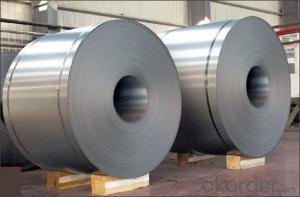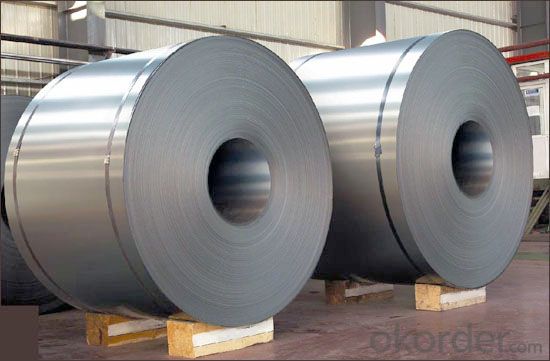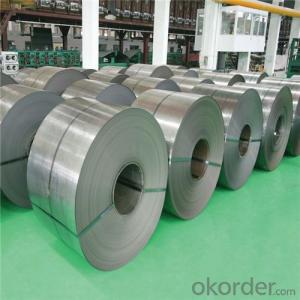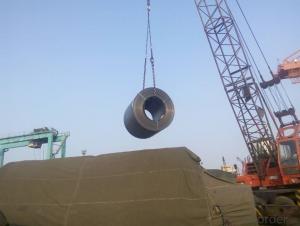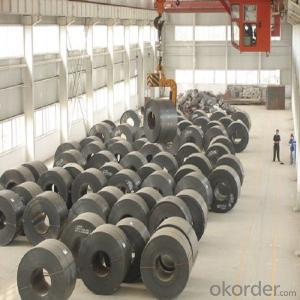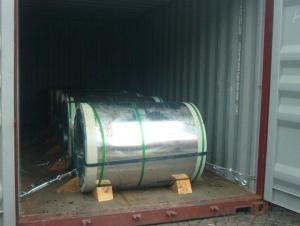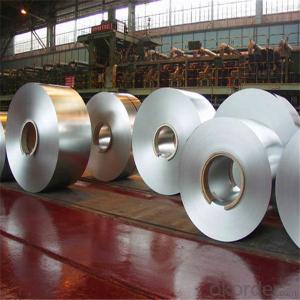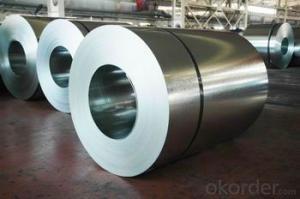COLD ROLLED STEEL COIL WITH HIGH QUALITY AND COMPETITVE PRICE NO.1
- Loading Port:
- Tianjin
- Payment Terms:
- TT OR LC
- Min Order Qty:
- 25 m.t.
- Supply Capability:
- 5000 m.t./month
OKorder Service Pledge
OKorder Financial Service
You Might Also Like
Cold rolling means that hot rolled steel coil is rolled below recrystallization temperature after pickling, and its finished product is full hard coil. After annealing process for full hard coil, the finished product is cold rolled production. The thin gauge cold rolled steel sheet and strip steel have advantages of low surface roughness, high dimension accuracy and good mechanical properties etc, and which have been widely used in auto manufacturing, home appliance, architecture, aviation, precision instrument, hardware and enameling industry etc.
Main specification:
COLD ROLLED STEEL | |
Thicknenss | 0.10mm-4.00mm |
Width | 600mm-2000mm |
Sheets length | 1200-6000mm |
Coil inner diameter | 508-610mm |
Surface treatement | matt finish/bright finish,oiling/dry, bright anneal/black anneal |
Coil weight | 3-5t |
We can supply customers' with different specifications of the highest quality and lowest price.
Cold rolled steel is the based material for galvanized steel coil and pre-painted galvanized steel coil. It is widely used in light industry for marking tank, furniture, refrigerators, washers, freezer plate, air conditioner, micro-wave oven, water heater, soot such machine etc.
With excellent cold bending molded manufacturablity, good decoration effect, strong anti-corrosion ability, galvanized steel coils and sheets are also pollution-free and easily recycled. Accordingly, they can be used as final products and basic plates of color coated steel coils.
Sincerely welcome to contact us for the future details if any item interest you ,and we will make every effort to assure that your requirements will be satisfied ,and we hope to establish long-term business relations with you on the basis of the equality and mutual benefit.
We are waiting for your feedback.
- Q: What is the diffrent Aluminized steel Type 1. stainless steel 409 430?
- Stainless steel 400 Series—ferritic and martensitic chromium alloys Type 409—cheapest type; used for automobile exhausts; ferritic (iron/chromium only) Type 430—decorative, e.g., for automotive trim; ferritic. Good formability, but with reduced temperature and corrosion resistance. Today, almost all bulk metal materials that are referred to loosely as aluminium, are actually alloys. For example, the common aluminium foils are alloys of 92% to 99% aluminium. Aluminized steel Type 1: 1xx.x series are minimum 99% aluminium
- Q: PLEASE PLEASE PLEASE!!!!!!!! HELP MEEEEEEEE!!!!!!! I need to know how can i prevent steel from rusting when it is exposed to water or salt water or vinegar. PLEASE TELL ME A LOT OF WAYS THAT I COULD PREVENT IT!!!!!!!!!!!!!!!!!!!!!!!!!!!!!!!!!!!!!!
- rust is oxidation . remove contact with O2 , it wont rust . you can place it in a oxygen free atmosphere , you could plate it with zinc or chrome , you can use a lead based paint .
- Q: How are steel coils protected against scratches and damage?
- Steel coils are protected against scratches and damage through a variety of methods. One common method is the application of a protective coating or film on the surface of the coils. This coating acts as a barrier, preventing direct contact between the steel surface and any potential sources of scratches or damage. The protective coating can be made of materials like polyethylene, PVC, or other types of plastic that are resistant to abrasion and impact. Additionally, steel coils are often wrapped or packaged using materials such as paper, cardboard, or plastic. This wrapping provides an extra layer of protection against scratches and damage during storage, transportation, and handling. The wrapping material acts as a cushion, absorbing any potential impacts or friction that could lead to scratches. Furthermore, steel coils may be stored and transported in specially designed containers or pallets that are equipped with features to minimize the risk of damage. For instance, these containers or pallets may have padded interiors, secure fastenings, or dividers that keep the coils in place and prevent them from rubbing against each other. In some cases, steel coils are also stored or transported in a controlled environment to minimize the risk of damage. This can include temperature-controlled warehouses or shipping containers that help to prevent the formation of moisture, which can lead to corrosion or other types of damage. Overall, a combination of protective coatings, wrapping materials, specialized containers, and controlled environments is employed to ensure that steel coils are adequately protected against scratches and damage throughout their lifecycle.
- Q: I asked a question last week about stainless steel and got some great answers. I combed all over the internet to try to figure this one out but could not find anything. What resists bending better: chrome vanadium steel (i.e. a steel commonly used to make tools) or stainless steel 304. My guess would be the chrome vanadium alloy but thats just a guess. Which on resist's bending better and by how much (#'s please :-)). Also, if anyone knows if chrome vanadium steel is cheaper than stainless steel 304 that would be awesome? I can't find a price per pound on chrome vanadium steel anywhere! Please help. Thanks in advance-Josh
- Steel Bending Strength
- Q: Does anyone know the lyrics to steel driving man by Dailey and Vincent. I would really appreciate it
- watch man of steel full movie online free adf.ly/dfxYD
- Q: Are steel buildings more durable than concrete building?
- both okorder /
- Q: What are the common coil thickness and width combinations available for steel coils?
- The common coil thickness and width combinations available for steel coils can vary depending on the specific requirements and standards of the industry. However, there are some commonly found combinations that are widely used. In terms of coil thickness, common options range from thin to thick coils. Thin coils typically have a thickness ranging from 0.4mm to 3.0mm, while medium thickness coils can be around 3.0mm to 6.0mm. For thicker coils, the range can be from 6.0mm to 25.0mm or even higher, depending on the specific application. Regarding coil width, it also varies based on the intended usage. Some common options include coils with widths of 600mm, 750mm, 900mm, 1000mm, 1200mm, 1250mm, and 1500mm. However, wider or narrower coils can also be available depending on the specific requirements of the customer or industry. Ultimately, the most suitable coil thickness and width combination will depend on factors such as the intended application, manufacturing processes, transportation limitations, and customer preferences. It is essential to consult with steel coil manufacturers or suppliers to determine the most appropriate options for your specific needs.
- Q: What is the process of pickling and oiling steel coils?
- To ensure the quality and protection of steel coils, a series of steps are undertaken in the process of pickling and oiling. The first step involves pickling, wherein impurities and scale are removed from the surface of the steel coil. This is achieved by immersing the coil in an acid bath, such as hydrochloric acid or sulfuric acid, which effectively dissolves any oxides, rust, or contaminants present on the surface. This step is critical as it readies the steel for further processing and safeguards against potential defects or corrosion. Following pickling, the steel coils are rinsed with water to eliminate any residual acid and then dried. Once they are clean and dry, a layer of oil is applied to provide temporary corrosion protection and lubrication during subsequent handling and transport. The oil coating acts as a barrier, preventing rusting or oxidation before the steel undergoes further processing or is utilized in various applications. The oiling process can be executed through various methods. One common approach is to apply the oil using a roller or brush, ensuring an even coating across the entire surface of the coil. Alternatively, the coils can be passed through a bath or spray chamber where the oil is administered. The choice of oil depends on the specific requirements of the steel and its intended use, with options ranging from mineral oil and synthetic oils to specialized rust-preventive coatings. Once the oiling process is complete, the steel coils are typically stacked, wrapped, or packaged for storage or transportation. It is crucial to handle the coils with care to avoid damaging the oil coating and compromising the corrosion protection it provides. Overall, the pickling and oiling of steel coils are indispensable steps in the steel manufacturing process. They ensure the quality, cleanliness, and protection of the steel, thereby prolonging its lifespan and enhancing its performance in various applications.
- Q: I know that mild steel is more brittle than cast iron....but that is all.......please help??Thank you in advance......Ruby:D
- Actually, the opposite is true. CAST IRON is generally brittle, while mild steel is not. Cast iron has a carbon content from about 2%-4%. Mild steel has less than one tenth as much carbon as cast iron- around 0.2% - 0.3%. Cast iron also typically has from 1%-3% silicon. Most mild steel contains no more than 0.3% silicon. Steel melts at ~1450 degrees C. The addition of large amounts of carbon and silicon to C.I. lower the melting point to around 1200 C and make it more fluid than molten steel. Obviously this makes it easier to melt and to pour. The main advantage of cast iron is it's cheap to produce. It also has some desirable properties despite it's brittleness. For example it's easy to cut and carve with machine tools. It's also very heat resistant and excellent at absorbing vibration. For this reason C.I. was commonly used for engine blocks and exhaust manifolds in cars and trucks in the past, (Cast aluminum engine blocks are more common these days because Al is much lighter and conducts heat better.) Cast iron also rusts much more slowly than steel which is why it's still commonly used for pipes. C.I. pipes have been known to last 300 years.
- Q: Can steel coils be stored outdoors?
- Steel coils can be stored outdoors, but it is important to protect them from moisture and other environmental elements to prevent rust and damage.
Send your message to us
COLD ROLLED STEEL COIL WITH HIGH QUALITY AND COMPETITVE PRICE NO.1
- Loading Port:
- Tianjin
- Payment Terms:
- TT OR LC
- Min Order Qty:
- 25 m.t.
- Supply Capability:
- 5000 m.t./month
OKorder Service Pledge
OKorder Financial Service
Similar products
Hot products
Hot Searches
Related keywords
